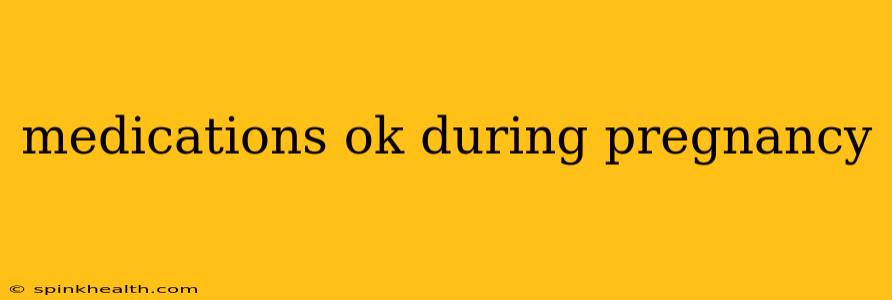Pregnancy is a journey filled with joy, anticipation, and, let's be honest, a fair amount of anxiety. One significant source of worry for many expectant mothers revolves around medication. Taking medication during pregnancy can feel like walking a tightrope – the need for relief versus the potential risks to the developing baby. This detailed guide aims to shed light on this often-fraught topic, empowering you with knowledge to discuss your specific concerns with your healthcare provider.
This isn't a definitive list of "safe" medications, because every pregnancy is unique, and the risks and benefits of medication vary depending on many factors, including:
- The specific medication: Different drugs have different effects on the developing fetus.
- The dosage: The amount of medication taken is crucial.
- The trimester of pregnancy: The developing fetus is most vulnerable during the first trimester.
- The mother's overall health: Pre-existing conditions influence the decision-making process.
It's crucial to remember that this information is for general knowledge only and does not replace consultation with a qualified healthcare professional. Always discuss any medication, even over-the-counter drugs, with your doctor or midwife before taking it during pregnancy.
What Medications Are Generally Considered Safe During Pregnancy?
While no medication is entirely without risk, some are generally considered safer than others during pregnancy. These are often categorized as pregnancy category A or B, meaning studies have shown little or no risk to the fetus. However, even these medications require careful consideration and monitoring. Examples include:
- Prenatal vitamins: Folic acid, iron, and other essential nutrients are vital for a healthy pregnancy and are generally safe.
- Certain antibiotics: Some antibiotics, like penicillin and amoxicillin, are often prescribed during pregnancy to treat infections.
- Insulin: For women with diabetes, insulin is essential to manage blood sugar levels.
- Thyroid medication: Women with hypothyroidism often need to continue taking thyroid medication throughout pregnancy.
Medications to Avoid During Pregnancy
Several medications carry a high risk of harm to the developing fetus and should generally be avoided during pregnancy. These often include:
- Non-steroidal anti-inflammatory drugs (NSAIDs): Except for short-term low doses of ibuprofen in later pregnancy under medical supervision.
- Certain pain relievers: Some pain relievers can cause birth defects or other complications.
- Accutane (isotretinoin): This medication is known to cause severe birth defects.
- Many medications used to treat depression or anxiety: The risks and benefits need to be carefully evaluated with a doctor.
- Opioids: Can lead to severe withdrawal symptoms in newborns.
What About Over-the-Counter Medications?
Even over-the-counter medications should be used cautiously during pregnancy. Always check with your doctor or midwife before taking anything, even seemingly innocuous products like:
- Pain relievers: Acetaminophen (Tylenol) is generally considered safe in moderate doses, but ibuprofen and other NSAIDs should be avoided.
- Antacids: Some antacids are safe, but others may not be.
- Cold and flu medications: Many contain ingredients that are not recommended during pregnancy.
Can I Take Medication If I'm Breastfeeding?
Similar considerations apply to breastfeeding. Some medications can pass into breast milk, potentially affecting the infant. Always discuss any medication you're considering taking with your doctor to assess the potential risks to your baby.
What Happens If I Accidentally Took Medication I Shouldn't Have?
If you accidentally took a medication that you weren't supposed to during pregnancy, contact your doctor or midwife immediately. Don't panic, but prompt medical advice is crucial. They can assess the situation and offer guidance on next steps.
Frequently Asked Questions
What are the risks of taking medication during pregnancy?
The risks vary greatly depending on the medication, dosage, and gestational age. Potential risks include birth defects, premature birth, low birth weight, and other complications.
How can I find out if a medication is safe during pregnancy?
Consult your doctor or midwife. They can assess your individual circumstances and provide tailored advice. Additionally, resources like the FDA's pregnancy risk categories can provide some information, but professional medical advice is paramount.
Is it safe to take herbal remedies during pregnancy?
Many herbal remedies haven't been adequately studied for safety during pregnancy. Always discuss herbal remedies with your doctor before taking them.
When should I contact my doctor about medication during pregnancy?
Contact your doctor immediately if you have any concerns about medication, experience any adverse effects after taking medication, or accidentally take a medication you shouldn't have.
Remember, your healthcare provider is your best resource for information about medication during pregnancy. Open communication and proactive engagement with your doctor or midwife are key to ensuring a healthy pregnancy for you and your baby. Never hesitate to ask questions and seek clarification regarding any concerns you may have.

